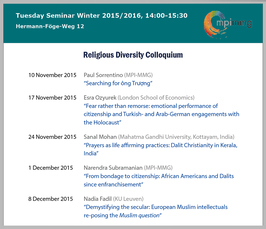"Demystifying the secular: European Muslim intellectuals re-posing the Muslim question"
Tuesday Seminar Winter 2015/2016
- Datum: 08.12.2015
- Uhrzeit: 14:00 - 15:30
- Vortragende: Nadia Fadil (KU Leuven)
- Nadia Fadil works as an Assistant Professor at the Interculturalism, Migration and Multiculturalism Research Centre at the KU Leuven. Her research interests revolve around the questions of secularism and religion, subjectivity, embodiment and affect and Islam as a discursive tradition. These questions are explored through an ethnographic engagement with the public debates around, and the lived experiences of, secular and pious Muslims in Brussels and Francophone Europe. Parts of her work have been published in edited volumes and peer-reviewed journals, and some of her most recent publications include “Recalling the Islam of the Parents. Politics of authentication of liberal and secular Muslims” (2015, published in Identities. Global Studies in Culture and Power) and “Rediscovering the Everyday Muslim: Notes on an Anthropological Fault-line” (2015, co-authored with Mayanthi Fernando and published in HAU. Journal of Ethnographic Theory).
- Ort: MPI-MMG, Hermann-Föge-Weg 12, Göttingen
- Raum: Conference Room

For more details please contact vdvoffice(at)mmg.mpg.de.
This lecture delves into some recent conversations among French Muslim intellectuals on the future of Islam in Europe. After more than ten years of ‘war on terror’ and continuous debates on the presence of visible forms of Islam in the public sphere, new interrogations have emerged amongst European Muslims on the desirability to become part of Europe. Focusing on the work of a relative newcomer in the Francophone European field, ic Aissam Ait-Yahya, this paper will try to show how some of these current interrogations are informed by a deeper ‘crisis of representation’ (Mbembe, Marshall), whereby master narratives such as secularization are critically challenged and repositioned within their cultural specificity. For more than a decade, Muslim intellectuals (such as Ramadan, Rammoussi or Ennasri) have traditionally sought to cultivate ethical and theological spaces that would enable Muslims to inscribe themselves as citizens in the European society. In so doing, they not only rely on a redefinition of a number of key theological concepts (cf. most notably the deconstruction of the opposition between “dar-al-harb” and “dar-al-islam”), but equally consider secularism (and laïcité) as a as an open ideological space which can accommodate Islamic beliefs and practices. The work of Ait-Yahya follows, on the other hand, a different route. The main aim is not to demonstrate the possible integration of Muslims in Europe, but to rather unpack the historical epistemological ingredients that help explaining the continuous tensions towards Muslims. And in so doing, he will primarily rely on the critical scholarship on secularism produced by European intellectuals and scholars who have demonstrated a historical and theological continuity between Christianity and secularism. Ait-Yahya will argue that the current debates on Islam rather reflect the persistent theological incommensurability that exists between Christianity and Islam. By re-theologizing the debate, he therefore seeks to critically challenge the ontological neutrality that is presumed in reigning master narratives such as secularization. By focusing on the work of Ait-Yahya, this paper will therefore also show how current debates amongst Muslim intellectuals cannot be dislocated from the wider epistemological context that surround them, and how debates that are internal to Western-European scholarship (produced within the universities) equally influence and affect ongoing debates among Muslim intellectuals on citizenship and integration.